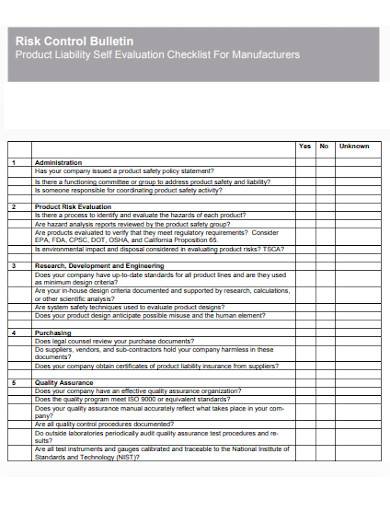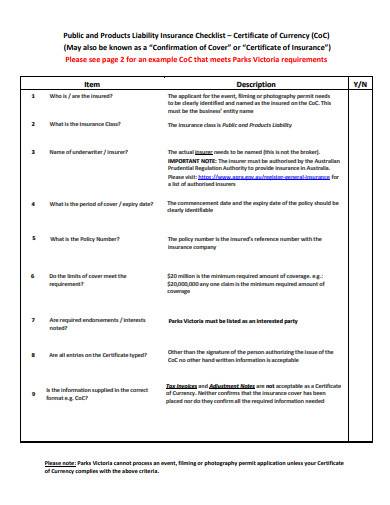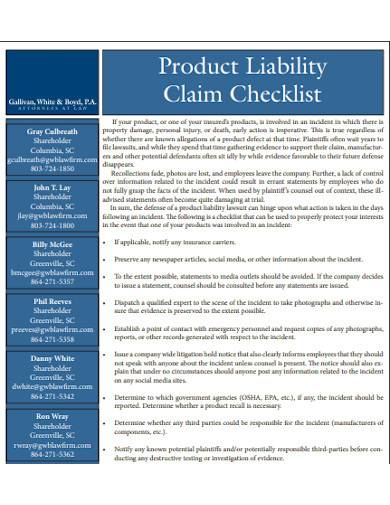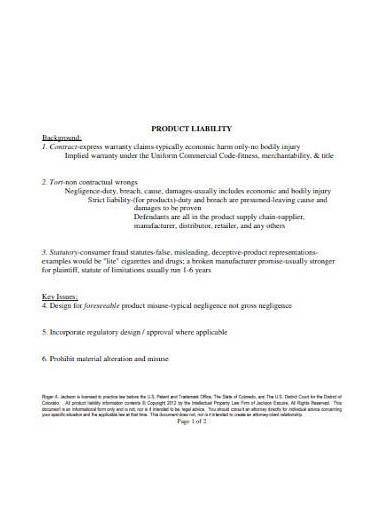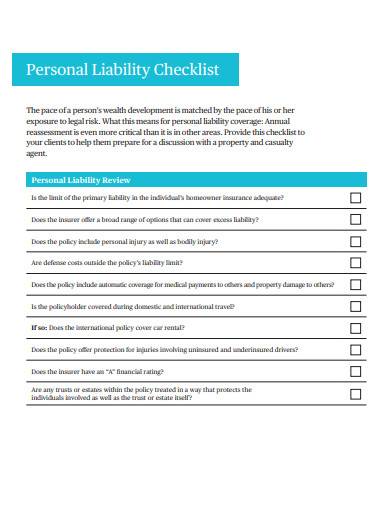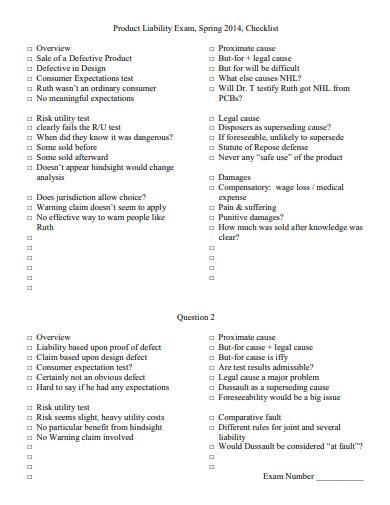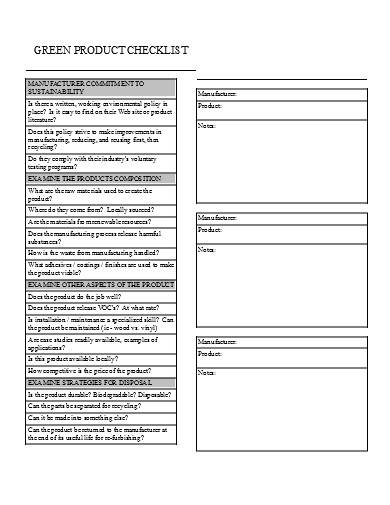No company wants to make a product that does more harm than good. That’s why there are tons of varying risk management tactics and plans that companies take. And one of the essential documents to have on hand to determine what liabilities a company may have regarding their manufactured products is known as a product liability checklist. Read on to know more and discover some examples of this document now!
FREE 6+ Product Liability Checklist Samples & Templates in PDF | MS Word
1. Product Liability Self Evaluation Checklist Template
2. Public and Products Liability Insurance Checklist
3. Product Liability Claim Checklist Template
4. Basic Product Liability Checklist Template
5. Personal Product Liability Checklist Template
6. Product Liability Exam Checklist
7. Sample Gree Product Liability Checklist
How to Make a Product Liability Checklist Effectively
Companies have product liability insurance policies and obligations. But, the insured amount varies greatly on the type of product companies have, and its level of risk. In specific, low-risk products have lower insurance requirements while high-risk or potentially dangerous once will have a higher amount-requirement as well. Moreover, according to HowMuch.net, the average insurance cost for low-risk and liability company products is just a quarter of a dollar per each $100 revenue. So, how can a company and its insurance company determine whether or not a product has low-risk or high-risk liability? Well, by using the product liability checklist. And before you proceed to make one, take note of the following tips first:
1. Draft and Enlist Everything to Include in the Checklist
Checklists are easy to create—you just have to make a table, then input details, and add a column for the remarks—but, what goes in it, such as its contents, must be appropriately decided. That’s why you have to make a draft first by enlisting every item to include in your checklist. Aside from that, you should also consider categorizing each item or grouping related ones together. This eases the process of determining the areas of liability for the company’s products.
2. Yes/No/Unknown
Most often, when one conducts a risk assessment, the common options are a mere yes and no. Unfortunately, when it comes to determining the liability levels of a company and its product, the answers should not be limited to yes and no, but must also have an “unknown” option with a remarks area for the details. The ”unknown” option will serve as a percentage label that prompts the company to review and recheck the product to address the item in the checklist. In addition, the remarks area will be for supporting discussions and suggestions about any item, regardless of the answers, be it a yes, no, or unknown.
3. Don’t Forget the Instructions
Well, you can forgo the instructions if it’s just you who will be using the checklist form. But, if not, and if you intend to reuse the form in the future, then add instructions and guidelines. You can place relevant instructions in each category, section, or on the first area of the product liability checklist. That way, the user, or you, will be able to read it before proceeding to answer the list.
4. Keep It Relevant and Simple
You are a product manufacturer, seller, and businessman, and obviously, you are busy. So, you must only include items in your checklist which are relevant to your purpose, which is to identify the level of liabilities you can to your product. Also, the designs and layout of your checklist must be kept simple. Use basic lines and font styles as opposed to elaborate ones which are not at all easy to decipher.
5. Use Templates
Surely, you can find product liability checklist templates anywhere. But, what we are offering you here are free and downloadable templates that you can use right away! Aside from that, we also have varieties for you to choose from. So, why not utilize our templates, instead of making one from scratch, if you’re not interested in creating documents and any forms or checklist sheets? On the one hand, you can also just use our sample forms and templates as guides that will help you as you make your checklists—all is up to you!
Why is a product liability checklist important?
Product liability checklists are important because these documents will help you know your liabilities, what you must do to avoid dealing with future lawsuits, and how you can cater your product to your customers better.
Does using a product liability checklist minimizes the possibility of my product and company facing lawsuits?
The answers would be yes and no. Yes, if, and only if you are incorporating every single issue and problem that you want to be prepared for. In specific, the checklist must help you know the risks and hazards of using your product, how much you are liable for, and what you must include in your product liability disclaimer for your customers. And no, if you are just merely copying a template online without customizing the contents for your company product’s liability checklist.
What questions should I include in my product liability checklist?
There are four types of product liability claims that you must be prepared to face, regardless of how sure you are that your product won’t be harming anybody. The four include manufacturing defects, design defects, marketing defects, and breach of warranty. Now, what is the relevance of each claim, you ask? Well, each claim will help you determine what questions and issues you must address. For instance, in addressing manufacturing defects concerns, you can ask questions that determine whether your company has a process that evaluates the manufacturing hazards of your product. While to address marketing defects, questions relating to whether or not you have made disclaimer and liability waivers for your customers will be relevant.
Managing a company can be challenging. That’s why it’s essential to be prepared than being surprised by lapses, which should have been avoided in the first place. So, don’t waste any more time; instead, choose from our templates above which product liability checklist will help you manage and establish your company products efficiently.
Related Posts
FREE 7+ Double Entry Bookkeeping Samples in MS Word | PDF
FREE 10+ Decision Matrix Samples in MS Word | PDF | DOC
FREE 13+ Daily Sales Report Samples [ Restaurant, Activity, Cash ]
FREE 10+ Customer Segmentation Strategy Samples in PDF | MS Word
FREE 5+ Customer Perception Survey Samples in PDF | DOC
FREE 7+ Customer Ledger Samples in PDF | MS Word | Excel
FREE 10+ Corporate Social Responsibility Policy Samples in PDF | MS Word
FREE 10+ Corporate Bylaws Samples in PDF | MS Word
FREE 8+ Consultant Business Plan Samples in PDF | MS Word
FREE 11+ Construction Application Samples in PDF | MS Word
FREE 9+ Client Information Sheet Samples in MS Word | Excel | Pages | Numbers | Google Docs | Google Sheets | PDF
FREE 10+ Cleaning Business Proposal Samples in PDF | MS Word | Google Docs | Pages
Sample Chart of Accounts Templates
FREE 10+ Business Travel Report Samples [ Market, Industry, Trip ]
FREE 10+ Business Debt Schedule Samples in PDF | MS Word

